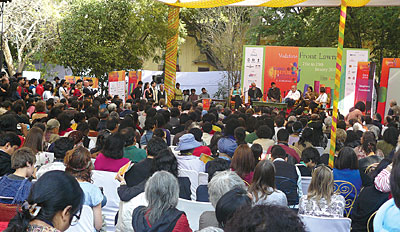 RABI THAPA |
When you have close to 50,000 people at a free event hosted within a couple of acres, you have to be up to the challenge. For this Beed, visiting the Jaipur Literature Festival for the second time, it was an impressive show. Events are getting bigger in Nepal, too, so there are a few lessons for us here.
To make a success of an event, you need a real tough general leading the way. At Jaipur, there were four venues, where hour-long sessions ran over five days. Packed audiences moved seamlessly from one venue to another. Importantly, when a session was meant to last an hour, it lasted sixty minutes. This may seem obvious, but in Nepal an hour usually has a variable number of minutes. If we are to host good events, then we need to ensure that people understand that a minute has sixty seconds and an hour has sixty minutes. Just watch the way our people talk on television shows or run conferences and seminars. We could take our cue from Nepa-laya, which is doing a good job of starting programs on time and putting up good shows.
Before I left Nepal, I was asked who was going to inaugurate the Jaipur festival. Perhaps the Prime Minister? Hardly. It was the Chief Minister of Rajasthan who did the honours, after which he discreetly made his exit, with nary a speech. The thousands present were then left to the literature they had come to celebrate. In Nepal, we would do well to discard our infatuation with political figures, who in any case are usually wholly unsuited to the events they are inaugurating.
For events to be successful, we need team performance, from the generals to the soldiers on the ground. For five days, this Beed watched a group of people whose only job was to pick up the trash. No matter what was going on, no matter who was on stage, they kept at their job. Shuttle vehicles took people to their hotels and back at regular intervals, making the whole experience much more restful for the attendees. It is people like these who make events a success. In Nepal, volunteers are more likely to be in the front row, listening to the concert, as no one wants to deal with filthy toilets. Those in charge of security are usually no better, and situations are much more likely to spiral out of control. Memories of a badly managed World Cup football final in our city stadium are still fresh.
Event management was the key to the success of the Jaipur festival. Nepali event managers would do well to visit Jaipur to get their own events right. There are companies like DMI in Nepal, who are getting better at defining professionalism, but the hosts of so-called event management firms need to learn what it is to deliver beyond people's expectations. It is not about resources, having the best audio-visual equipment, or the best venues, it is the management of such resources that makes events stand out.
Kudos to Teamworks, the producers of the Jaipur Literature Festival. We hope to see them do something in Nepal too, in collaboration with Nepali firms. Perhaps a Southasian Cultural Festival?
READ ALSO:
Jaipur: jostle or josh?, RABI THAPA



